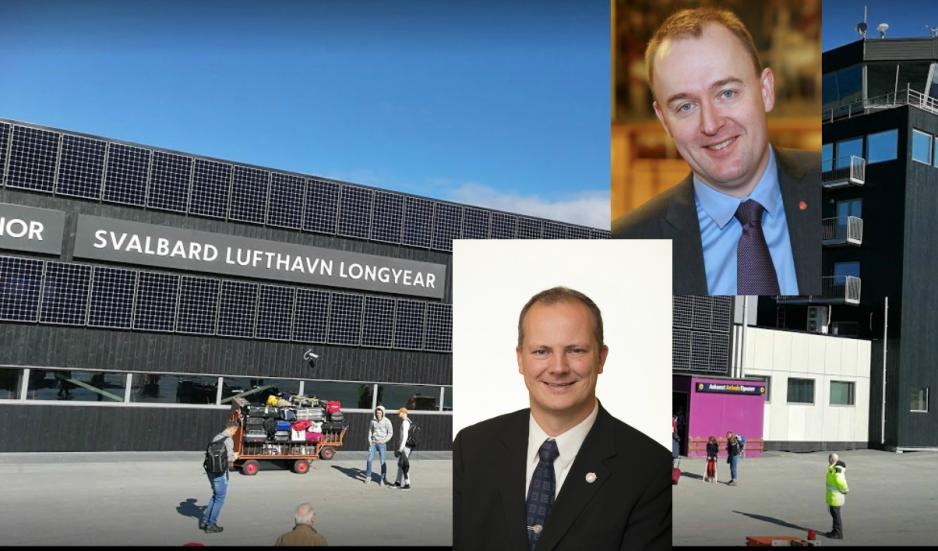Norwegian Government Quiet About Svalbard Airport

The Norwegian government keeps quiet about the downgrading of Svalbard airport. There has been no impact assessment prior to the decision being made.
The public recently learned that the Norwegian Ministry of Transportation has downgraded Svalbard airport from ‘international’ to ‘national’ status.
Responded with surprise
One of the most important consequences of the downgrading is that it is no longer possible to have direct flight routes from abroad to Longyearbyen. Finnair tried establishing this in 2015.
The Transportation Department’s decision surprised the entire Svalbard community, and both the airport manager as well as the leader of the local business union responded with surprise.
The question quickly arose about whether one department really knows what the other is doing, in particular since the Ministry of Trade, Industry and Fisheries in its recent Svalbard policy paper pointed at tourism as one of the areas that can contribute to new growth on the islands.
Today’s air traffic will not change, the Department says, however, it does not mention what it would take to remain an international airport.
No impact assessment
High North News has repeatedly requested the background material for this decision from the Ministry of Transportation. We have also asked the Department whether this decision has been considered in light of the Department’s impact assessment instructions.
The Department remains silent on this. The two documents that HNN has received only refer to this being a decision from the Department and that the reason is that the airport does not meet the requirements necessary for keeping its ‘international’ classification.
The government’s 2016 ‘Instruction relating to impact assessment of state initiatives’ states that:
‘The instruction for impact assessment of state initiative applies to all preparing of background materials for decisions to be made in regard to state initiatives. This instruction thus applies broadly and involves both minor and major state initiatives. The starting point is that all state initiatives that have consequences beyond the state’s activities are covered by the requirements of this instruction.’
- Should have been assessed
Assistant Professor Jon Christian Nordrum at the Institute of Public Law at the University of Oslo says there is much to suggest that this decision should have been assessed.
- I am not familiar with the details of this case; however, in general, all decisions and initiatives that have consequences for society should be preceded by an impact assessment. That is the whole point of that instruction, Nordrum says to High North News. He adds:
- If there are no preparatory documents, that is a problem in and of itself. If the department is trying to keep existing documents away from the public, that is also a problem.
There may, nevertheless, be a certain doubt about whether the impact assessment instruction applies to this decision. However, the department should in any case explain why the requirements of the instruction were not to apply.
Even if the instruction were not to apply, there would nevertheless be ample reasons to conduct an impact assessment and have a public hearing about decisions that have consequences for the local community. That applies in particular to this case, where the airport holds a key role in the development of a local community, Jon Christian Nordrum says.
Must answer in parliament
The department’s decision has raised attention in Stortinget too, the Norwegian parliament. MP Eirik SIvertsen (Labour, Nordland County) has submitted a question in writing to the Minister of Transport and Communications about what the reason for the downgrading is, about which analyses that have been conducted beforehand and not to mention; what it would take for the airport to maintain its status as an ‘international’ airport.
The response from Transport and Communications Minister Ketil Solvik-Olsen has not contributed to softening the questions:
‘The decision to change the status of Svalbard airport is based in internal work of the departments and in this process, the interest of local business, including tourism, and inhabitants has been emphasized. The government wants to facilitate a sustainable development of tourism on Svalbard that contributes to support the goals of Norwegian Svalbard policies. There are still good opportunities for further developing tourism and its products on Svalbard even if the status of Svalbard airport has been changed. Existing air traffic is not affected by the change, and today’s arrangements with charter traffic from abroad continues like before’, the Minister’s response says – among others.
- This does not even answer my questions, Eirik Sivertsen says to High North News. He says that he will raise the question in the parliament’s formal Question Time at his earliest convenience.
Visit Svalbard not heard
General Manager of Visit Svalbard Ronny Brunvoll says he is surprised at both the decision itself as well as to the Minister’s statement that the interest of local tourism has been emphasized.
- We have not heard anything about this until the decision came, more or less under everyone’s radar. However, we have said for a decade already that it is exactly foreign flights that may contribute to a much-needed expansion of the tourist season up here.
That is in fact the only thing we have requested, and we also formally submitted this view to the government’s whitepaper on Svalbard, Brunvoll says to High North News.
He adds that the tourist season expansion they want does not involve Norwegian guests, but rather foreign guests who stay for three to four days.
- With a more or less forced overnight stay on the Norwegian mainland on their way up and down, this segment is seriously undermined and it will considerably increase the costs of such a holiday, Ronny Brunvoll of Visit Svalbard says.
Local government equally surprised
Longyearbyen Local Community Council is as surprised as anyone else about the department’s decision. Deputy Councilor Eirik Berger (Liberals) says he is not aware of the Ministry of Transportation’s asking about the local government’s view prior to making the decision.
- I was very surprised and disappointed. I would have wanted to hear from the department before such a decision was introduced, Berger says to HNN.
Les artikkelen på norsk



